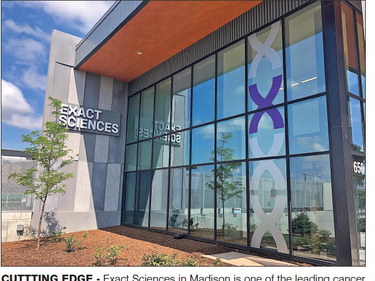Abby native breaks down COVID tests


By Ross Pattermann
The sun is out, temperatures are on the rise and summer in Wisconsin is finally here. A casual drive through Colby or Abbotsford shows children playing in a park, teenagers enjoying a pick up game of basketball and people enjoying evening walks and sunsets. It’s so easy to forget that the country is still very much grappling with the COVID-19 pandemic. Fears over the coronavirus have diminished in the months since it was first declared a pandemic in March. That’s a serious problem, says Danielle Writz.
Writz, a 2008 graduate of Abbotsford High, lives in Madison and works for Exact Sciences, one of the first labs in the state to conduct COVID-19 testing. Since the onset of the outbreak she has been at the forefront of combating COVID-19.
“My official title is Specimen Processing Trainer . . . and I started at Exact Sciences back on February 24 of this year,” she recalled in an email. “Soon after my initial training, the COVID-19 pandemic quickly changed many people’s personal and professional lives.”
Wisconsin has seen a recent surge in positive COVID-19 cases this month, with July 14 seeing an all-time high of 964 new positive cases, bringing Wisconsin’s total positive cases to almost 38,000.
Clark County has each seen an increase in positive cases in recent weeks, with total positive cases coming in at 118, with seven reported deaths.
“Most recently the surge in COVID-19 cases are in young adults, some of whom are asymptomatic and are spreading the virus if they are not following CDC and institutional guidelines,” Writz says.
While younger individuals seemingly have a better resistance against the novel coronavirus, Wrtiz says that’s no guarantee of immunity.
“SARS-CoV2 is aggressive and virulent,” she wrote. “Although the elderly and immuno-compromised are most susceptible to COVID-19, as they are with most diseases, COVID-19 infects and can kill any person of any age or health status.”
Not everything has been doom and gloom, though. Nearly 80 percent of positive cases have successfully recovered, and testing has dramatically increased since March, from a few hundred tests a week to many thousands in a single day.
That’s the result of hard work from people like Writz.
“We had to act quickly to help address a rapidly evolving public health need,” she said. “Our laboratory reconfigured space intended for future Cologuard tests, purchased new equipment, and adapted automation equipment to process COVID-19 samples.”
Now, 80 labs are processing tests in the state. Writz says the work being done at Exact Sciences goes far beyond just conducting COVID-19 tests. “In addition to our normal training assessments, we contributed to the design, development and implementation of new protocols and procedures to launch COVID-19 testing efficiently and effectively,” Writz says. “The entire leadership team has done an amazing job to respond to increased testing volumes,” she added. “The last three months have been exhausting at times. However, throughout this tremendous challenge, it’s been satisfying to know my team is doing their best to do their part during this pandemic.”
It’s been a huge undertaking for Exact Sciences and its 4,000 employees. The company’s original purpose was acting as one of the world’s leading cancer diagnostic labs, but since March, Exact Sciences has been working with the DHS in Wisconsin to “provide the supplies and laboratory capacity to support tens of thousands of COVID-19 tests each week.”
In spite of increased testing and awareness of COVID-19, there is still much confusion surrounding the testing process, what it entails, and what information labs like Exact Sciences can process.
The test itself is relatively simple and minimally invasive. A health care technician collects a sample through a nasal swab, and over the next 72 hours, labs like Exact Sciences run tests looking for the virus, but not the antibodies.
“Upon receipt, we check each sample for integrity, and enter patient information into our lab’s electronic records system,” Writz explains. “The samples then go through a sophisticated, highly automated lab process that involves looking for ribonucleic acid (RNA) associated with COVID-19.”
The results of these tests are then transmitted from Exact Sciences to the health care provider who ordered the test. Writz expects demand for testing to increase in the coming weeks and months, with medical supplies in high demand all over the world.
“We are fortunate to have supply chain experts and procurement teams who acted quickly to secure supplies when the pandemic arrived in the United States. As a result, we’ve been able to continue our testing without supply shortages.”
As cases rise, she urges Wisconsinites to exercise caution, socially distance when possible and to practice proper hygiene. This means washing hands, wearing personal protection equipment and above all being vigilant and sympathetic towards others.
Writz still has family living in the area, including her mother, Nina Gresser Writz, father, Dr. Paul Writz, and grandparents, Daniel and Mary Writz.
“Growing up in central Wisconsin, I remember a pervasive ‘love thy neighbor as yourself’ ideology,” Writz says. “When you see everyone as your neighbor, there is no difference between the elderly and immuno-compromised and ‘my relatives and friends.’”

CUTTTING EDGE -Exact Sciences in Madison is one of the leading cancer diagnostic companies in the world. Since March they have worked closely with Wisconsin’s DHS to provide COVID-19 testing. SUBMITTED PHOTO/EXACT SCIENCES
